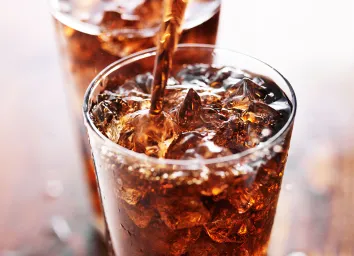Side Effects of Giving up Soda, According to Dietitians
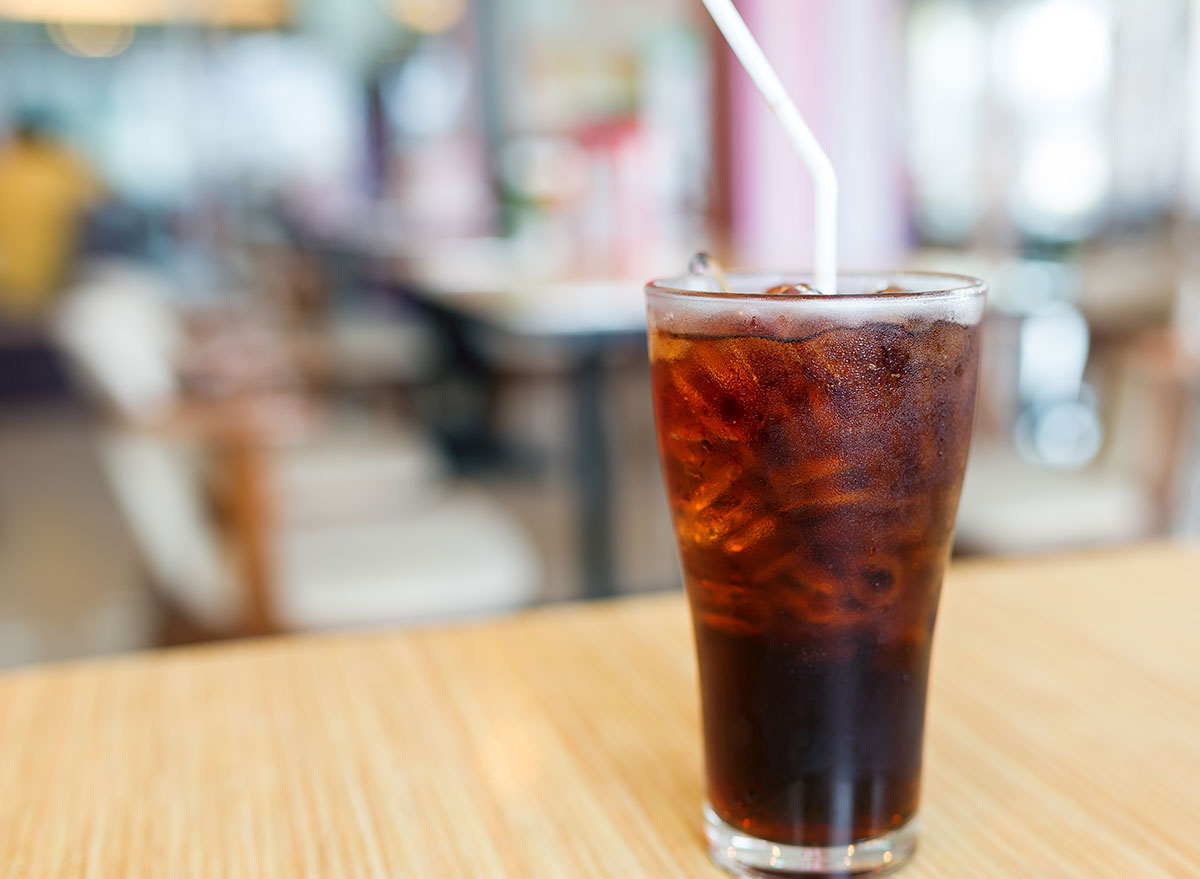
We get it—there’s nothing like enjoying a soda with a bag of buttery popcorn when you’re out to see a movie. While this particular snack is a delicious treat once in a blue moon, drinking soda on a regular—even daily—basis can do a lot of damage to your health. Between the increased liquid sugar and the empty calories, soda really isn’t doing your body any favors. By giving up soda, your body will see an immense amount of improvement thanks to these side effects.
We spoke with a few registered dietitians to learn what exactly happens to your body when giving up soda, and while there is one negative side effect, a majority of them are positive. It may even convince you to start giving up the sugary stuff for good. Here’s what they had to say, and for even more drinking tips, be sure to read up on our list of 108 Most Popular Sodas Ranked by How Toxic They Are.
You can lose weight.

Lisa R. Young PhD, RDN, and the author of Finally Full, Finally Slim, points out that soda is full of empty calories. If you’re not familiar, “empty calories” is a term used for food that is highly caloric but doesn’t provide your body with any kind of sustenance to keep you feeling full. When you stop drinking soda, your body is more likely to lose weight because you are significantly cutting down on those empty calories in your diet.
“Regular sodas are high in calories, high in sugar, and absent in nutrients,” says Amy Goodson, MS, RD, CSSD, LD, and author of The Sports Nutrition Playbook. “They can also cause blood sugar spikes and drops leaving your blood sugar, and your energy levels, on a roller coaster.”
These blood sugar spikes can someday lead to weight-related diseases, such as type 2 diabetes.
“Even if you only drink diet sodas, you may see some weight loss when [you] eliminate soda and [you] can decrease your risk of developing diabetes, as both diet and regular sodas have been connected with the development of insulin resistance that leads to diabetes,” says Ricci-Lee Hotz, MS, RDN at a Taste of Health and Expert at Testing.com.
Here’s One Major Side Effect of Drinking Sugary Beverages, Says New Study.
You’ll decrease your risk of disease.
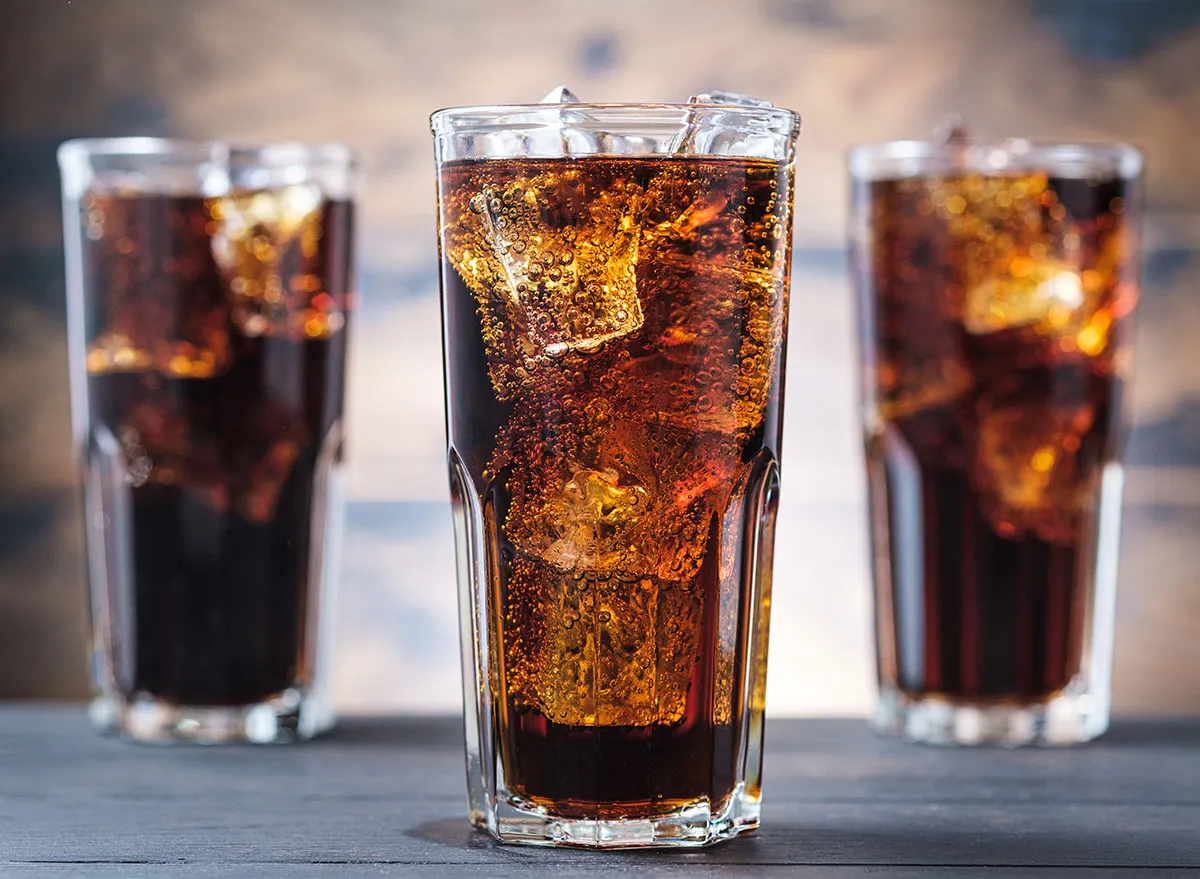
Diabetes isn’t the only disease where the risk is decreased after giving up soda. In fact, soda has been scientifically proven to lead to other types of chronic diseases. By giving up soda, your risk of developing these diseases significantly decreases.
“You can markedly improve your health, and reduce your risk for chronic diseases including diabetes, heart disease, and cancer,” says Young.
“[You’ll] even save your heart by eliminating a component of your diet that can cause increased fat deposits in your body which can put you at higher risk of cardiovascular disease,” says Hotz.
Get even more healthy tips straight to your inbox by signing up for our newsletter!
Your body’s overall health will improve.
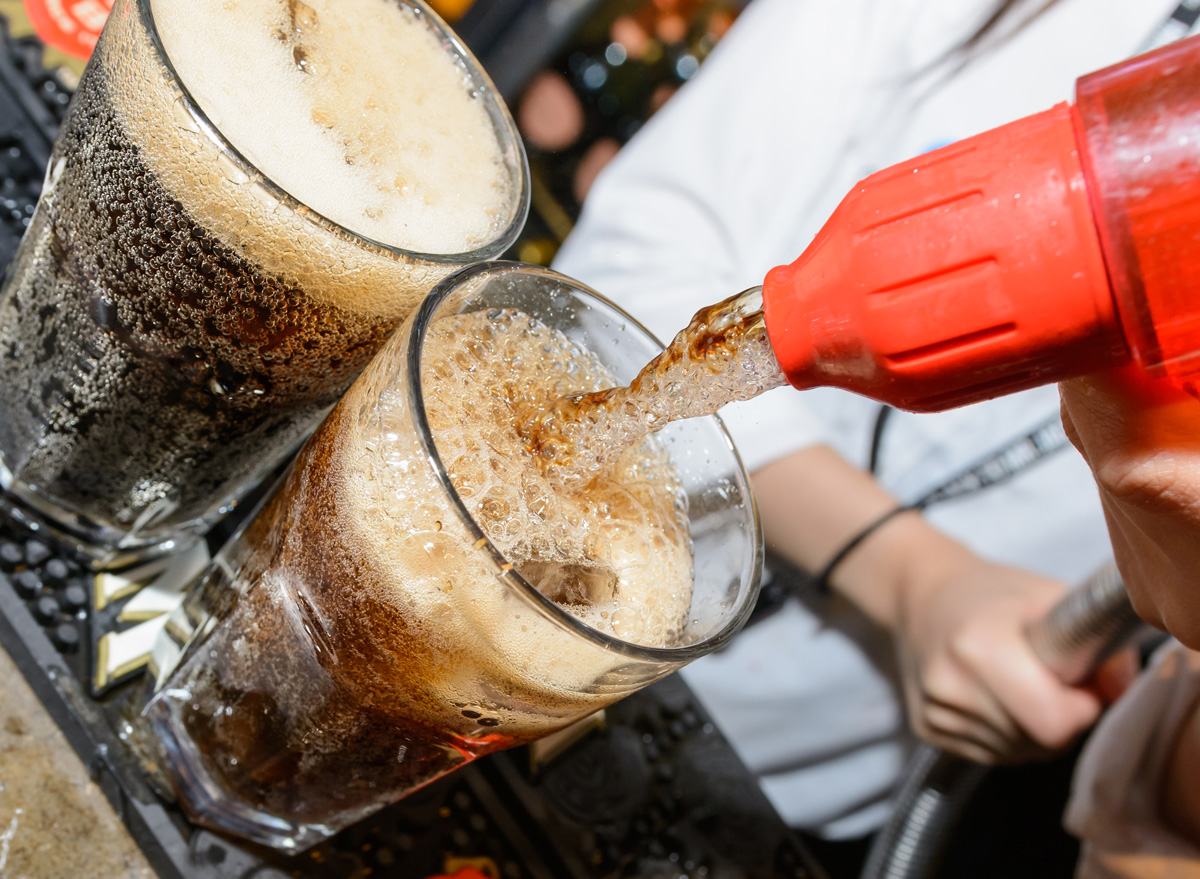
“Soda is one of the most unhealthy beverages you can consume, and giving it up will definitely make you feel better and improve your health overall,” says Megan Byrd, RD, from The Oregon Dietitian. “When you give up soda, your body will become more hydrated and you’ll have less inflammation. By substituting out water and other healthy drinks instead of soda, you increase your metabolism, improve your cardiac health, and you may even lose some weight!”
A positive change in your body’s metabolism and weight aren’t the only side effects of giving up soda. In fact, even your bone and teeth health will significantly improve.
“Quitting soda can help to improve your bone health and decreases the risk of osteoporosis, kidney failure, bladder infection, and fight against diabetes and other chronic diseases,” says Shannon Henry, RD at EZCare Clinic.
“You will be saving your teeth and bone health by eliminating some of the chemical components of soda that can weaken your bones and stain your teeth,” says Hotz.
Along with soda, here are The 6 Worst Foods for Your Teeth.
You may experience “withdrawal” symptoms.
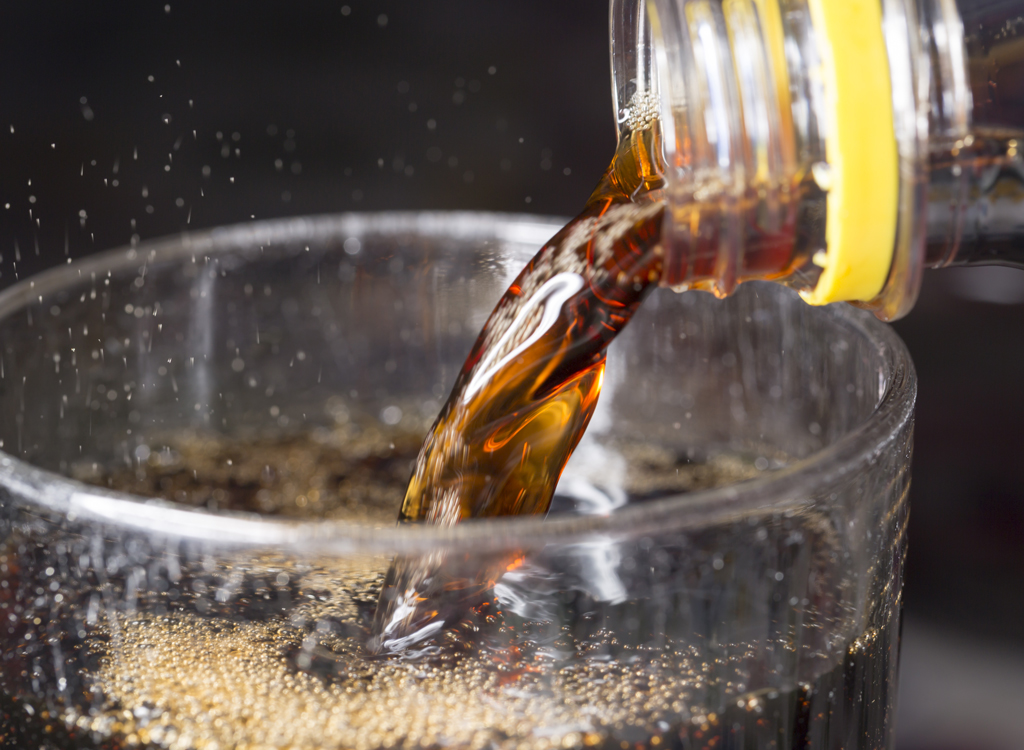
While this would be considered the only “negative” side effect of giving up soda, the truth is, this symptom is a sign that drinking soda wasn’t good for your health in the first place.
“When you give up soda, while you may experience initial ‘withdrawal’ symptoms such as headaches or fatigue, especially if you drink caffeinated soda, you will actually begin to see a significant amount of benefits in your body,” says Hotz.
If soda is your main source of caffeine, you may experience some of those symptoms of caffeine withdrawal. However, drinking black coffee or even plain black or green tea can still give you that caffeine fix without all of the empty calories and added sugars.
Withdrawal symptoms when giving up soda can also come from the added sugar intake. According to Medical News Today, if you consume a significant amount of sugar on a regular basis, you may experience all kinds of withdrawal symptoms including headaches, nausea, muscle aches, lack of energy, irritability, and anxiety, and serious cravings. One study published by Frontiers in Psychiatry also found that withdrawal symptoms from sugar can even look similar to the withdrawal symptoms of serious drugs.
However, when you look at all of the benefits of giving up soda, the temporary withdrawal symptoms seem small when compared with the long-term, lifelong benefits of giving up soda. One study published by PLOS One shows how sugar consumption in high quantities can cause brain changes long-term even similar to nicotine addiction.
You’ll crave less sugary foods.
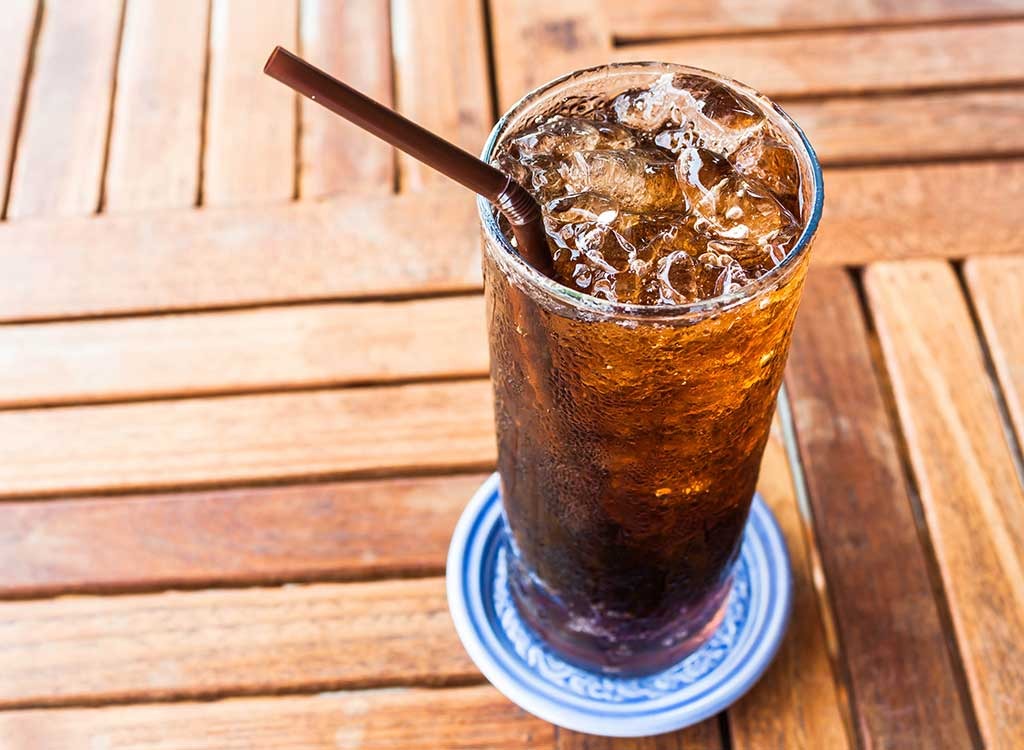
“When you give up carbonated soft drinks, your body slowly recovers from the most addictive substance- liquid sugar high-fructose corn syrup (HFCS), that is known to be even more addictive than cocaine and is the number one cause for obesity in America,” says Talia Segal Fidler, MS, HHC, AADP, and holistic nutritionist from The Lodge at Woodloch.
“By cutting on the liquid calories you can have more space for real calories from whole foods,” says Segal Fidler. “Over time you will lose the cravings for overly sugary flavorings, (even from the artificial sweeteners that are added to some of those soft drinks), and start developing the natural taste for real foods such as fruits and vegetables as nature created them.”
Here’s This One Trick Will Cut Your Sugar Cravings for Good.
You’re less likely to overeat.

While giving up soda can help decrease your craving for sugary foods, according to Trista Best, MPH, RD, LD, a registered dietitian at Balance One Supplements, it can also decrease your chances of overeating throughout the day. Even when drinking diet soda.
“The artificial sweeteners in soda have been linked to overeating in meals following their consumption, this fact alone leads to weight gain,” says Best. “Sodas that are sweetened with real sugar can also cause weight gain as sugar is a highly inflammatory and calorie-dense compound.”
Do the artificial sweeteners cause the weight gain itself? Not exactly. However, according to Harvard Health, artificial sweeteners tend to be even sweeter sometimes than the real thing, which can mess with your sugar receptors and cause you to believe that food without sweetness tastes downright awful. Cravings for sweet things can occur, which could lead to eating sugary items and gaining weight down the road.
By giving up soda, both regular and diet, you are giving your body a chance to decrease those sugar cravings and you’ll be less likely to over-consume your meals.
Here are the 30 Worst Sodas That Are Never Worth Drinking.
